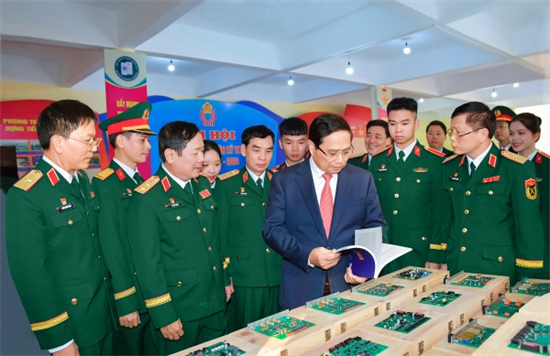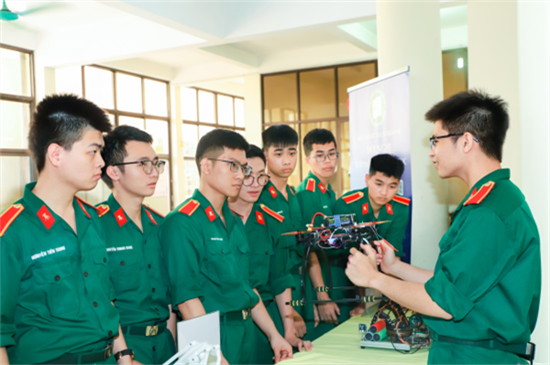Military Technical Academy steps up innovation, science - technology development, and digital transformation
Under the Politburo’s Resolution 57-NQ/TW, dated 22 December 2024, and Resolution 3488-NQ/QUTW, dated 29 January 2025, by the Central Military Commission (CMC) on breakthroughs in science - technology development, innovation, and digital transformation within the Vietnam People’s Army (VPA), Military Technical Academy (MTA) has been taking synchronised measures, with building and developing science - technology potential as the centre, raising the quality of scientific - technological activities and mastering new, modern technologies as the key, promoting cooperation and creating a favourable environment as the incentive for innovation.
 |
| Prime Minister Pham Minh Chinh visits the MTA’s exhibition of science - technology products |
As the top multidisciplinary technical university of the VPA and the country, the MTA is responsible for training high-quality human resources, undertaking researches, pilot production, and advanced technological transfer, fostering international integration, making significant contributions to Fatherland construction and protection and the development of Vietnam’s military science and technology. In the process, the MTA has always advocated a “close combination of training and science research”, seeing them as the two central political missions. The MTA’s Party Committee and Board of Directors have thoroughly grasped resolutions and strategies by the Party, State, CMC, and Ministry of National Defence (MND) on science - technology development and digital transformation, proactively issuing many resolutions, plans, and projects with specific targets, road map, and measures in accordance with realities of VPA building and Fatherland protection. With a strong sense of political responsibility, the MTA has widely disseminated the 13th Politburo’s Resolution 57-NQ/TW and the CMC’s Resolution 3488-NQ/QUTW within itself. At the same time, the MTA’s Party Committee has released Resolution 2040-NQ/ĐU, dated 20 March 2025, on breakthroughs in science - technology development, innovation, and digital transformation within the Academy; Plan 1268/KH-HV, dated 21 March 2025, on executing Resolution 3488-NQ/QUTW has been formulated as the basis for the MTA to delegate tasks to its offices and units.
Grasping those above-mentioned Resolutions of the Politburo and CMC, the MTA has established goals: “By 2030, the MTA will become a leading science - technology research centre of the country, some of its fields will be equivalent to those of major universities in the region, and it will be ranked among the top 700 leading, advanced universities worldwide. By 2045, it will be ranked among the top 500 leading, advanced universities in the world”. In the process, the MTA has focused on basic research and mastery of foundation and core technologies for developing strategic technologies and products. It has given advice to the CMC and MND on strategies for training science - technology cadres, developing military science and technology, ensuring technical support, transferring technologies, and upgrading and modernising technical equipment to meet the requirements of VPA building and national industrialisation and modernisation.
To successfully fulfil all those goals, the MTA will continue enhancing innovation, science - technology development, and digital transformation as a solid foundation for its training work, with a focus on well implementing several tasks and measures as follows.
First, enhancing leadership and direction of all-level party committees and commands, raising public awareness, achieving consensus within the entire MTA about innovation, science - technology development, and digital transformation. This measure plays a decisive role in guiding, fostering, and ensuring the robust, sustainable development of science research, innovation, and digital transformation within the MTA. To that end, the MTA will direct its units and offices to grasp and introduce the Politburo’s Resolution 57-NQ/TW and the CMC’s Resolution 3488-NQ/QUTW to all target individuals, particularly all-level party committee members and commanders. Doing so will render all cadres and party members fully aware of the key role of science, technology, innovation, and digital transformation in the current era, the viewpoints and targets of development towards 2030, with a vision towards 2045, as well as groups of central tasks and measures. Due attention will be paid to making all staff members of the MTA clearly understand that science - technology development, innovation, and digital transformation represent a fundamental breakthrough and top priority to greatly contribute to the building of a revolutionary, regular, highly-skilled, modern VPA and the cause of national industrialisation and modernisation. The MTA will review, adjust, and complete its action plans and programs in accordance with its functions, tasks, and realities in the new period.
Additionally, great value will be attached to closely aligning action plans for the Resolutions of the Politburo and the CMC with the Project on “developing the MTA towards 2030, with a vision towards 2045” as well as other resolutions and plans of the MTA on science - technology development. In the process, the MTA will bring into play knowledge and the spirit of daring to think, daring to do, daring to take responsibility among its cadres and party members, particularly its key leaders and scientists, opportunely detect and commend individuals and collectives with outstanding achievements as an incentive for widely, deeply fostering innovation within itself.
Second, building high-calibre human resources and utilising talents to meet the requirements of science - technology development and digital transformation. Fully aware that “scientists act as the decisive factor” in the revolution on science - technology development, innovation, and digital transformation, over the years, the MTA has adopted various measures to build high-quality human resources, combine training with science research, and promote its strength in terms of training to develop and utilise talents in a long-term, strategic way. In the upcoming time, the MTA will continue detecting, training, and employing technical cadres, especially in the key fields, such as weaponry research, design, and manufacturing, information technology, cyber warfare, digital transformation, automated command. At the same time, it will focus on raising the quality of training young officers and scientists in accordance with defence industry development and VPA modernisation.
In the process, the MTA will combine training within itself with training linkage according to the model of research university and smart school. It will proactively select and deploy its cadres to overseas training courses under the country’s projects, with priority given to the key fields, such as semiconductor industry, cloud computing, information security, UAV, automated command, weaponry improvement. It will help its cadres and lecturers participate in programs and projects, maintain and raise the quality of holding scientific - technological conferences/workshops and contests, such as young researchers’ conference, scientific creative youth conference, Minirobocon, information security contest, specialised academic meeting. It will continue working with units both inside and outside the VPA to organise research trips for its cadres, lecturers, and cadets, particularly to services and corps moving straight to modernity, with the aim of enabling them to align theory with practice. It will create a favourable condition for its scientists and cadets to join foreign partners in scientific training and research. By 2030, 40% of its lecturers will be able to teach their specialities in foreign languages and be eligible for teaching at regional and international universities. Those efforts will contribute to building a corps of technical cadres with great knowledge, creative scientific thinking, and capacity to gradually master and develop modern technologies for the cause of Fatherland construction and protection.
 |
| A typical science product of the MTA introduced at the 45th Scientific Creative Youth Conference |
Third, creating an open environment to foster innovation and science - technology development. This is one of the key factors in allowing research units, scientists, lecturers, and cadets to promote their creativity and proactivity and encourage them to research and develop scientific products for serving tasks of the MTA and the VPA in the new situation. Hence, the MTA has always concentrated on effectively tapping all resources to construct infrastructures and acquire modern equipment for science research, actively developing strong research organisations, offices, and groups, completing mechanisms and policies to stimulate scientific - technological activities in a specialised, professional manner. In the upcoming time, the MTA will continue proposing the Project on establishing a Key Research Centre for Artificial Intelligence (AI) and Data Science within the MND. This Centre will gather specialised research groups, form domestic and global cooperation networks for AI and application of AI based on big data to the VPA’s important sectors and fields; at the same time, a network of research groups for AI application within other academies, institutes, and schools across the VPA will be established. Besides, the MTA will propose building modern laboratories for weaponry research, design, manufacturing, modernisation, and transfer; special importance will be attached to investing in laboratories for basic research, foundation technology, core technology, and strategic technology. Simultaneously, the MTA will develop common digital platforms and ensure that those platforms will operate smoothly, effectively in the digital environment.
The MTA will continue adhering to the guidelines on amending the VPA’s Science and Technology Work Charter, the Law on Science and Technology, and other relevant laws to propose and complete regulations on science - technology development, innovation, and digital transformation for the sake of VPA modernisation. Emphasis will be placed on supplementing special mechanisms, creating a favourable legal corridor, and settling drawbacks as the basis for encouraging science - technology development, innovation, and digital transformation across the MTA.
Fourth, focusing on raising the quality of scientific - technological activities, mastering new, modern technologies, and enhancing domestic and international cooperation. Adhering to orientations for science - technology development and the road map for VPA modernisation by our Party and State, the MTA has adjusted its long-term, medium-term, and yearly research orientations to ensure synchronicity and a harmony between basic research and applied research and effectively facilitate military - defence tasks; by 2030, the MTA’s facilities and level of science, technology, innovation, and digital transformation will be among the VPA’s top units; some fields, such as optical - optoelectronic - laser equipment, AI, automated command, and advanced radio communication will be among the country’s leading groups and achieve regional and global standards.
To that end, the MTA will foster basic and decipherment research and step by step master foundation, core, and strategic technologies for design, manufacturing, and modernisation as well as for information security assurance within hi-tech weapons and equipment. It will strive to master several foundation, core, strategic, and digital technologies, such as AI, Internet of Things, big data, semiconductor, quantum technology, nanotechnology, mobile communication (5G, 6G, and next generations), satellite communication, geospatial technology, advanced material technology, and some other emerging technologies. Besides, it will step up applied research to create hi-tech weapons, equipment, and products for combat and combat training, establish modes of technical work for hi-tech weaponry, ensure security for communication systems, guarantee national sovereignty in digital platforms and cyber space, facilitate digital transformation, automated command, and modernisation of command, management, and operation work within the VPA, and foster socio-economic development. It will continue upholding the guidelines on “aligning training with science research” via various strategic measures relevant to realities and new task requirements.
Furthermore, the MTA will continue expanding and improving cooperation with universities and research centres both at home and abroad, particularly with top countries in AI, semiconductor industry, cloud computing, and new strategic technologies. It will proactively build and perfect mechanisms and policies to encourage overseas Vietnamese scientists and foreign experts to take part in science, innovation, and digital transformation activities in military - defence fields. It will actively participate in prestigious international rankings to gradually assert its academic position and widely, deeply integrate itself into the world’s science and technology.
Fully aware of its pride, responsibility, and role as a leading centre for military science - technology training and research, the MTA will strive to take the lead in science - technology development, innovation, and digital transformation, build itself into a smart research school, actively, responsibly participate in programs and plans of the country and VPA, and significantly contribute to VPA building and national development in the new era.
Lt. Gen., Prof., Dr LE MINH THAI
Director of the MTA